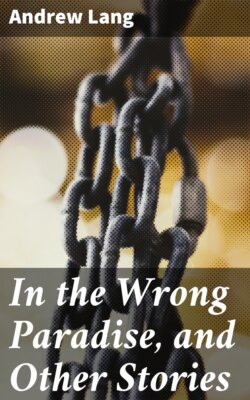Читать книгу In the Wrong Paradise, and Other Stories - Andrew Lang - Страница 6
На сайте Литреса книга снята с продажи.
III. THE PROPHECY.
ОглавлениеTable of Contents
The priest and the man with the gold circlet, whom I took to be a chief, now met, and, fixing their eyes on me, held a conversation of which, naturally, I understood nothing. I maintained an unmoved demeanour, and, by way of showing my indifference, and also of impressing the natives with the superiority of our civilization, I took out and wound up my watch, which, I was glad to find, had not been utterly ruined by the salt water. Meanwhile the priest was fumbling in his casket, whence he produced a bundle of very ragged and smoky old bits of parchment and scraps of potsherds. These he placed in the hands of his attendants, who received them kneeling. From the very bottom of the casket he extracted some thin plates of a greyish metal, lead, I believe, all mouldy, stained, and ragged. Over these he pored and puzzled for some time, trying, as I guessed, to make out something inscribed on this curious substitute for writing-paper. I had now recovered my presence of mind, and, thinking at once to astonish and propitiate, I drew from my pocket, wiped, and presented to him my spectacles, indicating, by example, the manner of their employment. No sooner did he behold these common articles of every-day use, than the priest’s knees began to knock together, and his old hands trembled so that he could scarcely fix the spectacles on his nose. When he had managed this it was plain that he found much less difficulty with his documents. He now turned them rapidly over, and presently discovered one thin sheet of lead, from which he began to read, or rather chant, in a slow measured tone, every now and then pausing and pointing to me, to my hat, and to the spectacles which he himself wore at the moment. The chief listened to him gravely, and with an expression of melancholy that grew deeper and sadder till the end. It was a strange scene.
I afterwards heard the matter of the prophecy, as it proved to be, which was thus delivered. I have written it down in the language of the natives, spelling it as best I might, and I give the translation which I made when I became more or less acquainted with their very difficult dialect. {23a} It will be seen that the prophecy, whatever its origin, was strangely fulfilled. Perhaps the gods of this people were not mere idols, but evil spirits, permitted, for some wise purpose, to delude their unhappy worshippers. {23b} This, doubtless, they might best do by occasionally telling the truth, as in my instance. But this theory—namely, that the gods of the heathen are perhaps evil and wandering spirits—is, for reasons which will afterwards appear, very painful to me, personally reminding me that I may have sinned as few have done since the days of the early Christians. But I trust this will not be made a reproach to me in our Connection, especially as I have been the humble instrument of so blessed a change in the land of the heathen, there being no more of them left. But, to return to the prophecy, it is given roughly here in English. It ran thus:—“But when a man, having a chimney pot on his head, and four eyes, appears, and when a sail-less ship also comes, sailing without wind and breathing smoke, then will destruction fall upon the Scherian island.” Perhaps, from this and other expressions to be offered in a later chapter, the learned will be able to determine whether the speech is of the Polynesian or the Papuan family, or whether, as I sometimes suspect, it is of neither, but of a character quite isolated and peculiar.
The effect produced on the mind of the chief by the prophecy amazed me, as he looked, for a native, quite a superior and intelligent person. None of them, however, as I found, escaped the influence of their baneful superstitions. Approaching me, he closely examined myself, my dress, and the spectacles which the old priest now held in his hands. The two men then had a hurried discussion, and I have afterwards seen reason to suppose that the chief was pointing out the absence of certain important elements in the fulfilment of the prophecy. Here was I, doubtless, “a man bearing a chimney on his head” (for in this light they regarded my hat), and having “four eyes,” that is, including my spectacles, a convenience with which they had hitherto been unacquainted. It was undeniable that a prophecy written by a person not accustomed to the resources of civilization, could not more accurately have described me and my appearance. But the “ship without sails” was still lacking to the completion of what had been foretold, as the chief seemed to indicate by waving his hand towards the sea. For the present, therefore, they might hope that the worst would not come to the worst. Probably this conclusion brought a ray of hope into the melancholy face of the chief, and the old priest himself left off trembling. They even smiled, and, in their conversation, which assumed a lighter tone, I caught and recorded in pencil on my shirt-cuff, for future explanation, words which sounded like aiskistos aneer, farmakos, catharma, and Thargeelyah. {25} Finally the aged priest hobbled back into his temple, and the chief, beckoning me to follow, passed within the courtyard of his house.
